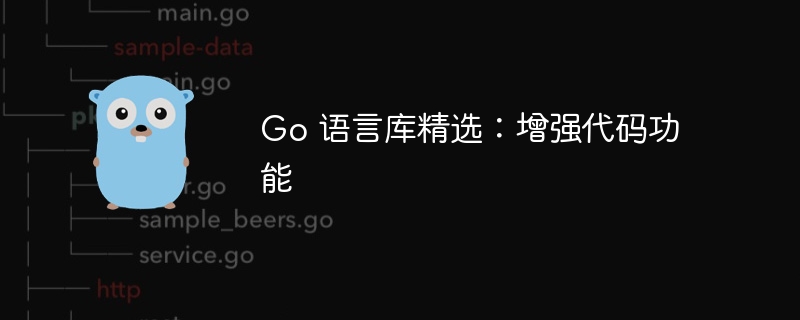Home >Backend Development >Golang >Go language library selection: enhancing code functionality
Go language library selection: enhancing code functionality
- 王林Original
- 2024-04-08 17:12:01654browse
The Go language library provides rich functions. This article introduces several useful libraries: String operation library (regexp): Provides powerful regular expression support for string matching, search and replacement. Concurrency library (sync): Provides concurrency primitives for controlling concurrent access. HTTP client library (http): supports custom HTTP clients and handles HTTP requests and responses. JSON encoding and decoding library (encoding/json): used to convert Go structures to and from JSON data.

Go Language Library Featured: Enhancing Code Functionality
The Go language ecosystem provides a rich library to help developers Expand app functionality and increase productivity. This article will introduce several useful libraries and demonstrate their capabilities through practical cases.
String operation library: regexp
Function:
- Provides powerful regular expression support, use For string matching, searching and replacing.
Practical case:
import "regexp"
func main() {
pattern := regexp.MustCompile("Go")
result := pattern.FindString("Go语言库")
if result == "" {
fmt.Println("没有匹配项")
} else {
fmt.Printf("匹配结果:%s\n", result)
}
}Concurrency library: sync
Function:
- Provides concurrency primitives, such as mutex locks, read-write locks and condition variables, to control concurrent access.
Practical case:
import "sync"
func main() {
var count int
var mu sync.Mutex
var wg sync.WaitGroup
wg.Add(10)
for i := 0; i < 10; i++ {
go func() {
mu.Lock()
count++
mu.Unlock()
wg.Done()
}()
}
wg.Wait()
fmt.Printf("最终计数值:%d\n", count)
}HTTP client library: http
Function:
- Provides low-level support for HTTP request and response processing to facilitate customization of HTTP clients.
Practical case:
import "net/http"
func main() {
resp, err := http.Get("https://golang.org/")
if err != nil {
fmt.Println("获取请求失败")
}
defer resp.Body.Close()
body, err := ioutil.ReadAll(resp.Body)
if err != nil {
fmt.Println("读取响应体失败")
}
fmt.Println(string(body))
}JSON encoding and decoding library: encoding/json
Function :
- Provides JSON encoding and decoding for converting Go structures and JSON data.
Practical Example:
import "encoding/json"
type Person struct {
Name string
Age int
}
func main() {
p := Person{Name: "John", Age: 30}
b, err := json.Marshal(p)
if err != nil {
fmt.Println("编码失败")
}
var p2 Person
err = json.Unmarshal(b, &p2)
if err != nil {
fmt.Println("解码失败")
}
fmt.Printf("解码后的结构:%v\n", p2)
}These libraries are just a few examples of Go language libraries, there are many other useful libraries to choose from. By leveraging these libraries, developers can simplify code, increase efficiency, and create more powerful Go applications.
The above is the detailed content of Go language library selection: enhancing code functionality. For more information, please follow other related articles on the PHP Chinese website!

